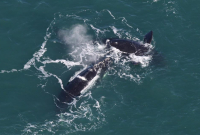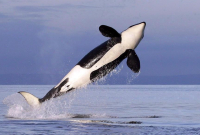Support strong Canadian climate journalism for 2025
The federal government will award a Canadian firm $9.5 million to provide hydrophones for an underwater listening station at a critical location for endangered southern resident killer whales, Transport Minister Marc Garneau said Thursday.
"Killer whales have a special significance for West Coast communities and for all Canadians. Southern resident killer whales face an imminent threat to their survival and recovery and immediate action is required. Protecting them is a priority for our government, and we are committed to take action," Garneau said at the Ocean Wise Marine Mammal Rescue Centre in Vancouver.
"Marine noise levels can affect killer whales' ability to hunt and communicate."
He said the contract will be awarded shortly.
The hydrophone system will be set up at Boundary Pass, alongside Pender and Saturna islands between the Lower Mainland and Vancouver Island. Garneau said it will be used to "detect and measure vessel noise, marine mammal data, and ambient noise data at Canada’s busiest port in near real time.”
Research shows human-caused noise pollution is a major cause for concern for marine life. Orcas, especially the southern residents, use echolocation to find food and communicate with one another. Ship noise drowns out their voices.
The plight of the whales was brought into particular focus earlier this year when Tahlequah, or J35, was seen carrying her dead calf in the waters near Victoria for 17 days. Councilors and trustees of Salish Sea island communities called Tahlequah their "canary in a coal mine," or a warning that efforts to build the Trans Mountain pipeline expansion – and see more ships in the area – would destroy the local environment.
Garneau's announcement follows news this fall that the government planned to invest $61.5 million to create ocean sanctuaries for the whales.
Southern resident killer whales have been listed as endangered under the Species at Risk Act for 15 years. In 2016 the government counted just 78 whales. Among the risks to the population cited by the government are "lack of prey availability, acoustic and physical disturbance, and bio-accumulation of contaminants," as well as the threat of "vessel strikes."
Earlier in the day, Garneau listened to the sounds of the Salish Sea through hydrophones.
“It’s quite noisy. It’s a little bit like the noise when your radio isn’t properly tuned, kind of like a white noise,” he told reporters after. “It gives you an idea of the kind of environment that marine mammals have to deal with as they move through the harbour.”
Hussein Alidina is a lead specialist for ocean conservation at WWF-Canada.
He said hydrophones are critical for understanding the sound signatures coming from ships, however there needs to be additional legislation to make companies change their practices. “We need to see government or industry taking steps to reduce noise.”
He said reducing the speed of certain vessels, moving ships away from habitats, or changing their hull and propellor design can contribute to reducing noise.
Editor's note: This story was updated at 4:23 p.m. PST on Nov. 29, 2018.






Comments